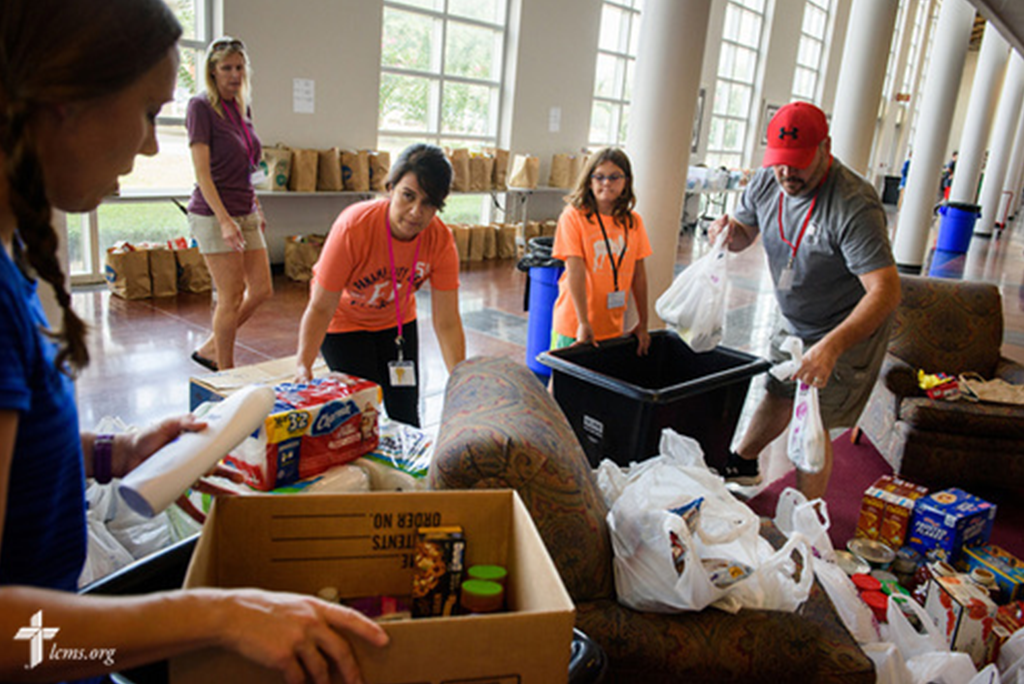
The influx of hurricanes and flooding in recent weeks has raised the level of interest in people wanting to donate their time, treasures and/or talents. Churches, agencies, members and others in the LCMS Texas and Florida/Georgia Districts are leading the way as Christ’s hands of service to their neighborhoods, communities and beyond.
Several months following my personal experience during Hurricane Katrina https://resources.lcms.org/2005/november-letters, I found myself back in the Southern District serving at a donation distribution warehouse.
Numerous pallets of items generously donated by people from around the country filled a significant portion of the warehouse. These many items still needed to be sorted, organized and placed in the appropriate area of the warehouse for distribution.
It was a tremendous task and at the end of my time there, pallets still needing attention remained untouched.
As those of us who are outside these regions determine how to best respond it can be helpful to become familiar with these guidelines from the National Donations Steering Committee*.
This group is composed of voluntary organizations active in disasters, federal, state and local government emergency management personnel has developed the following information for people interested in supporting disaster relief efforts.
- FINANCIAL CONTRIBUTIONS ARE OFTEN THE BEST KIND OF DONATION TO MAKE.
Providing a financial contribution to a voluntary agency involved in disaster relief is often the most sensible and the most efficient way of helping the people in need after a disaster. These agencies have disaster skills in many areas such as disaster needs assessment, disaster clean-up, mass feeding, mass shelter, first aid, crisis counseling, pastoral care, child-care, home repair, family casework, meeting “unmet needs” and many other areas.
Consider purchasing prepaid gift cards or debit cards to be used at local stores for the purchase of necessary items. These donations make a difference in the lives of people and provide an economic benefit to the community.
- USED CLOTHING IS RARELY A USEFUL ITEM TO COLLECT FOR DISASTER RELIEF.
Used clothing is rarely a useful item to collect and send into the disaster area because it is hard to clean, sort, pack, transport, store, and distribute. Mounds of clothing take up valuable warehouse space and frequently end up being discarded.
- CONFIRM THE NEED BEFORE BEGINNING A COLLECTION OF DONATED GOODS.
The most effective way the public can assist is to support the experienced disaster relief organizations with either financial contributions or in-kind goods and services that the organizations report are needed.
- DONATE THROUGH AN ORGANIZATION.
It is never a good idea to collect goods for disaster relief without a firm plan in place that confirms the goods are needed and that addresses who will receive the goods, how they will be transported and how the goods will be distributed. Donors will find that it is often most practical to focus on one or two items that an organization says is needed rather than collect a variety of items and have boxes filled with mixed goods.
- TRANSPORTATION MUST BE PLANNED IN ADVANCE.
Transportation is frequently a major challenge for donors. It must be planned for in advance otherwise a donor can easily be stuck with large amounts of donated goods and no means to bring it to the recipient agency in the disaster area. Don’t assume unsolicited relief supplies will be transported at no charge. The donor has the primary responsibility to find transportation for the donated goods.
- DONATED GOODS MUST BE WELL PACKED AND LABELED.
After confirming that the goods are needed and there is a plan to receive, store, and distribute them be sure that the goods are properly sorted, packaged and labeled. Specific content lists should be taped to the side of each box sent. This allows the receiving officials to determine what is in the box without opening it, and gets it to the proper distribution location in a timely manner. Put yourself in the shoes of the person on the receiving end of the shipment and think about making the unloading, unpacking, warehousing, and distribution as simple as possible.
May these words of Paul to the Corinthian congregation be our guide:
12 For the ministry of this service is not only supplying the needs of the saints but is also overflowing in many thanksgivings to God. 13 By their approval of this service, they will glorify God because of your submission that comes from your confession of the gospel of Christ, and the generosity of your contribution for them and for all others, 14 while they long for you and pray for you, because of the surpassing grace of God upon you. 15 Thanks be to God for his inexpressible gift!
2 Corinthians 9:12-15 (ESV)
*An expanded PDF version of this information included in Mercy in Action (Lutheran Early Response Team Training Manual) is available by contacting info@lcms.org.